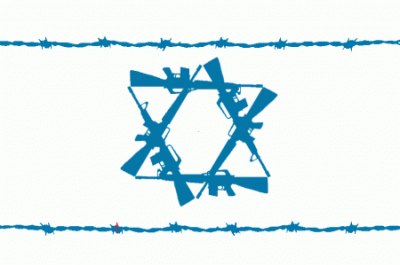In photos: Palestinian Workers’ Everyday Nightmare at Israeli Checkpoints

The Eyal terminal at the city of Qalqiliya is one of forty fixed checkpoints located along the boundary between the occupied West Bank and Israel. The terminals are part of an elaborate system of physical and administrative obstacles that Palestinians must navigate in order to enter Israel to work. Every Sunday thousands arrive to the terminal before sunrise to begin their workweek; for many it’s the start of a 12-plus hour day which will begin and end at the same metal turnstile.
Eyal checkpoint was opened in 2004 after the completion of Israel’s wall that completely surrounds the city of Qalqiliya. The economic effects of Israeli movement restrictions on Palestinians in this region have been particularly acute, requiring many men and women to make the tortuous journey to Israel for work. These pictures were taken between 3:45am and 7am on 11 May 2013 and underline both the dehumanizing nature of the occupation and the resolve of the Palestinian people who face these hardships every day.

Palestinian men line up at the Eyal checkpoint in the northern occupied West Bank city of Qalqiliya. Thousands of Palestinian men arrive at the checkpoint before dawn due to the long delays that keep them waiting for hours as they attempt to enter Israel for work.

The Palestinian men must first pass through a series of remotely-controlled metal turnstiles, a feature of many checkpoints operated throughout the West Bank. At Eyal, a private security officer controls the flow of workers from an enclosed booth, unlocking the gate and allowing Palestinian passage into Israel one person at a time.

A Palestinian man has a coffee at one of the numerous food stalls that line the road leading up to the checkpoint. The makeshift booths serve the thousands of workers passing through Eyal in the early hours.

With food, coffee and cigarettes in hand, Palestinian men walk to get in the line that will lead them through the caged pathway at Eyal checkpoint.

The movement restrictions that dominate Palestinian life in the occupied West Bank are well-represented at Eyal. As one man waiting in line said simply: “Life here is a series of cages.”

A section of Israel’s wall is visible in the background, purportedly built as a security measure but in effect annexes occupied West Bank land. Once completed, the wall will extend more than 700 kilometers — twice as long as the boundary between Israel and the West Bank — with 85 percent of the wall built in Palestinian territory, thus becoming the de facto border. In Qalqiliya, the barrier confines the city in every direction, cutting the town off from its surrounding land and neighboring communities.

A car cuts through a line of Palestinian men as they wait just outside the enclosed passageway that leads to the entrance of the checkpoint. A constant stream of cars and taxis ferry people from the surrounding area to the checkpoint that serves as the main entrance point into Israel for Palestinian workers throughout the area.

Muslim Palestinians pray at the Eyal checkpoint before crossing into Israel.

As the morning light arrives, the surrounding military infrastructure comes into focus. From the checkpoint and beyond, the Qalqiliya region is dominated by walls, fences and towers.

An imposing Israeli military tower looks down over the workers as they pass through the checkpoint. Eyal is one of forty permanent Israeli checkpoints that control Palestinian movement.

A Palestinian youth runs a makeshift coffee stand while his father sits beside a fire before getting in line to cross into Israel.

A Palestinian man lights a cigarette while waiting to cross through the checkpoint.

Palestinian men smoke cigarettes before getting into the line that will take them through the Eyal checkpoint to their jobs inside Israel. The majority of those passing into Israel to work are middle-aged men who work in Tel Aviv. Israel will only allow work permits for those over 35; young persons, especially men, are considered a security risk.

A Palestinian youth takes a break from working at a makeshift coffee stand at the Eyal checkpoint. Vendors sell food and drinks at the checkpoint to the thousands of men who cross the border each day to reach their jobs inside Israel.

A Palestinian man grimaces in pain as he pushes through the single gate that serves as the only entrance to the Eyal checkpoint. The gate frequently locks without warning, forcing the men to wait in a crowded, fenced-in enclosure.

A man rises above the crowd in an attempt to orchestrate the passage of an increasingly restless crowd. A security officer can be heard shouting commands in Hebrew over the loudspeaker, threatening the Palestinian crowd with more delays.

Two Palestinian men wait to cross through the Eyal checkpoint. Many wait on the edges of the crowd for a lull in the commotion, which usually doesn’t happen until later in the morning. The permit system in place allows passage of certain people at specified times, and all who pass through Eyal must return through the same terminal.

The sun rises on a crowd of Palestinian men still waiting to file through the single gate into the Eyal checkpoint. The checkpoint will remain congested until late into the morning.
Text and captions by Sam Gilbert.
Daniel Tepper is a photographer based in Ramallah specializing in the practices and effects of the Israeli occupation of Palestine. Follow him on Instagram @daniel_tepper. All images by Daniel Tepper.

